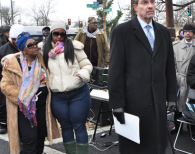Vassar students stand up to hate group
Students at Vassar College have raised more than $84,000 for The Trevor Project, which provides crisis intervention and suicide prevention services to LGBT youth, in response to a visit from a hate group.
According to college newspaper The Miscellany News, students started to organize their counterprotest immediately after hearing that the Westboro Baptist Church were planning to picket the college on Feb. 28. The fundraiser was intended to raise $4,500, $100 for every minute the hate group intended to picket the college. Instead, they raised twice that amount in under twelve hours.
LGBT
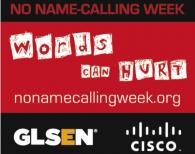
In one GLSEN (the Gay, Lesbian & Straight Education Network) study of school climate, elementary school students and teachers reported constant use of disparaging remarks like "retard" and "that's so gay" in their schools and classrooms. Research conducted by GLSEN continues to highlight the prevalence of biased language, name-calling and bullying in U.S. schools.
GLSEN'S No Name-Calling Week is an annual week of educational activities that takes place in schools across the nation. No Name-Calling Week seeks to resolve the problem of name-calling and bullying in schools and provide students and teachers with the tools to create a more positive classroom environment. NIOS is proud to be one of over 40 national partner organizations of No Name-Calling Week, and we hope to inspire schools to create a more tolerant and accepting atmosphere for all students.
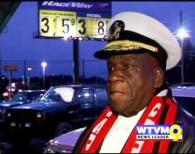
Neo-Nazi attempts to rebuild compound in Idaho
Photo by Matt McKnight.
A man who studied under Aryan Nations founder Richard Butler is trying to rebuild a neo-Nazi compound in Idaho that was demolished more than a decade ago, according to the Southern Poverty Law Center.
But Shaun Patrick Winkler, 33, has likely already failed in that attempt for several reasons—the SPLC has found that Winkler has stopped making payments on the property and that it is going into foreclosure. Winkler has also “logged his property without permission” and “violated state land use rules.” He also ran for sheriff in the area and lost.
“The story there for me is that he’s failed at this attempt. That’s the real story here today,” says Tony Stewart, a local human rights leader, in an interview with Northwest Public Radio.
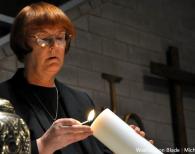
From Washington Blade: Transgender Remembrance Day was observed at the Metropolitan Community Church of D.C. on Tuesday. (Photo by Michael Key)
They held candlelit vigils and film screenings. They read the names of victims and marched in the streets. Across the country last week, groups of people came together to remember the victims of anti-transgender violence, whether that was in small gatherings like in Winona, MN or in formal discussions with staff members from the White House.
Transgender Remembrance Day is recognized around the world as a day when victims can speak out and others can stand up to the violence that continues to plague this community. The day was created in honor of Rita Hester, a transgender woman who was murdered in Allston, MA, in 1998.
Allston and other Boston neighborhoods remembered Hester last week in a series of events. Read more about the effort spearheaded by local churches to continue the conversation about anti-transgender violence in Massachusetts.

Palo Alto High interviews younger brother Noah Hornikat It Gets Indie last year. Photo Courtesy of Julian Hornik.
When Julian Hornik was cyber-bullied for being gay, he didn’t have to worry about having anything but the full support from his family.
In middle school, the young musician found derogatory comments on YouTube videos of his performances. Classmates created a Facebook page that targeted him for being gay. With the support of his family, he said it wasn’t hard for him to “push it away.”
Julian and his younger brother Noah are part of an extended family of people who support LGBT rights. While Noah has not personally experienced bullying, he believes the internet allows people to feel “safer and more confident” when they bully and harass others.
“They don’t have to see the impact,” Noah said. “People will go a lot farther.”

D.C. Chief of Police Cathy Lanier discusses the formation of the new task force during
an interview with the Washington Blade. Photo: Strother Gaines/Washington Blade
Washington, D.C. leaders are ramping up efforts to improve hate crime investigations.
Last month, the district mayor and police chief launched a task force that will evaluate how the Metropolitan Police Department investigates and reports hate crimes, particularly those targeting the LGBT community. The task force aims to identify and strengthen investigation weaknesses and build better police-community relations.
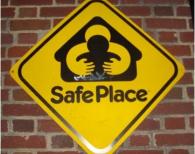
This is the third in a five-part series published by our public media partneras at Fronteras. Listen to the accompanying radio piece.
By Adrian Florido
LGBT Group Builds Support In Southern Arizona
TUCSON, Ariz. — In Tucson, Ariz., a nonprofit group is working to reduce hate and bias against the LGBT community. It’s called Wingspan and it is doing so through education; training even government organizations about tolerance within the ranks.
Inside the airy rooms of Studio One, a group of artists is meeting on a late Saturday afternoon. The logistics are a little daunting but they have no shortage of volunteers. They are preparing for a Latino gay pride festival.
The circle of artists brings together burlesque performers, photographers, event planners, singers, dancers and poets.
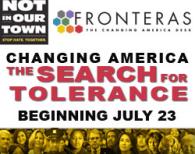
Tune into this original Not In Our Town programming from our public media partners at Fronteras.
We asked you this question in October 2011: Does your community make you feel safe and included, or scared and marginalized?
The Fronteras: Changing America Desk has joined forces with Not in Our Town documentary producers to determine how hate affects communities throughout the Southwest and what people like you are doing about it.
Tune in to hear these stories on KJZZ at 6:30 and 8:30 a.m. during Morning Edition
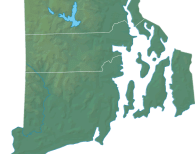
Rhode Island is now the 13th state to include gender-identity and expression in its hate crime laws.
The Transgender Hate Crimes Monitoring Bill (S2488) was introduced to the Rhode Island General Assembly on February 16. It passed the Rhode Island House on May 24, and Governor Lincoln D Chafee signed the bill on May 30.
The Transgender Hate Crimes Monitoring Bill assists in the research and safety of Rhode Island’s transgender population. In addition, because the bill addresses all hate crimes committed from gender identity or expression bias, victims of all gender identities are protected under this statute.
Specifically, the bill adds gender identity and expression to Rhode Island’s hate crimes reporting statute, which already specified race, religion, gender, disability and sexual orientation as motivating prejudices.
This now requires Rhode Island State Police to not only report hate crimes based on gender identity and expression, but to also undergo mandatory training regarding the handling of gender identity and expression related hate crimes.
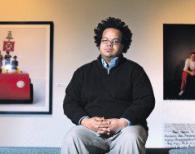
"African-American people are LGBT people, they are allies of the LGBT community, and family members of LGBT people. The African-American community is not homogeneous. Our community is diverse just like the LGBT community."
When opponents of the LGBT community used President Obama's support of same-sex marriage as an opportunity to drive a wedge between African-American and LGBT communities, Eran Thompson spoke up. Thompson is an activist who serves his hometown of Billings, Montana as the chairperson of Not In Our Town Billings and serves on the board of the Montana Human Rights Network and Not In Our Town/The Working Group. In this piece, Thompson addresses the supporters of the Montana Human Rights Network.
